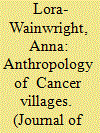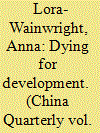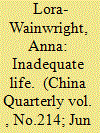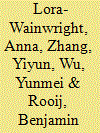| Srl | Item |
| 1 |
ID:
095831


|
|
|
|
|
| Publication |
2010.
|
| Summary/Abstract |
This paper examines how villagers in rural Sichuan understand the development of cancer, how they attempt to make sense of why it seems widespread and of why it affects particular individuals. Lay aetiologies of cancer such as negative emotions, smoking, consuming alcohol and preserved vegetables are addressed in order to contextualise environmentally related factors, and explain why they may or not be resorted to. With reference to ethnographic examples, I argue that awareness of pollution's effects on health can only gain strength when it is consonant with locals' experience and moral parameters and when it is perceived to be productive in attracting media attention and obtaining redress from various levels of state bureaucracy.
|
|
|
|
|
|
|
|
|
|
|
|
|
|
|
|
| 2 |
ID:
121202


|
|
|
| 3 |
ID:
121205


|
|
|
|
|
| Publication |
2013.
|
| Summary/Abstract |
Based on fieldwork in a heavily industrialized Yunnan village, this article examines how villagers understand and respond to pollution-related health risks. Building on Robert Weller's (2006) concept of environmental consciousness, it shows that Baocun villagers have developed an acute environmental health consciousness. However, despite earlier instances of collective activism, they no longer act as a community to oppose the harm to their bodies caused by pollution. The article investigates the role of uncertainty surrounding illness causation in deterring action. It argues that uncertainty about pollution's effects on health is reinforced by the social, political and economic contexts and developments in the past few decades. As a result, villagers engage in a form of "lay epidemiology" to make sense of the effects of pollution on their health, but not in a "popular epidemiology" consisting of collective action against presumed health damages. The article concludes with some thoughts on how locals act within and despite uncertainty.
|
|
|
|
|
|
|
|
|
|
|
|
|
|
|
|
| 4 |
ID:
113931


|
|
|
|
|
| Publication |
2012.
|
| Summary/Abstract |
It is often assumed that, when citizens do not oppose pollution, it is due to their ignorance of its effects or to structural barriers to change. This article argues that a sense that pollution is inevitable is also a major obstacle. We outline the gradual formation of environmental subjects who have learnt to value their environment in ways consonant with the seemingly inevitable presence of pollution. We argue that perceptions of inevitability were produced by: (1) the subordination of villagers to their leaders and the dependence of both on local industries; (2) experiences with protests; and (3) the framing of the exploitation of local resources as part of a broader national project of development. This study sheds light on the study of environmental protests in China by illustrating how parameters for contention come into being and how they are intertwined with the governance of the village and of the environment.
|
|
|
|
|
|
|
|
|
|
|
|
|
|
|
|